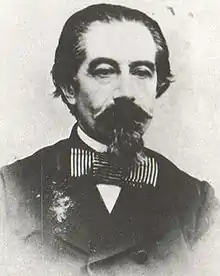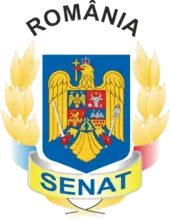Ștefan Golescu
Ștefan Golescu (1809 – 1874) was a Wallachian Romanian politician who served as the Minister of Foreign Affairs for two terms from 1 March 1867 to 5 August 1867 and from 13 November 1867 to 30 April 1868, and as Prime Minister of Romania between 26 November 1867 and 12 May 1868.
Ștefan Golescu | |
|---|---|
 | |
| Minister of Foreign Affairs | |
| In office 1 March 1867 – 5 August 1867 | |
| Monarch | Carol I of Romania |
| Preceded by | George Barbu Știrbei |
| Succeeded by | Alexandru Teriachiu |
| In office 13 November 1867 – 30 April 1868 | |
| Preceded by | Alexandru Teriachiu |
| Succeeded by | Nicolae Golescu |
| Prime Minister of Romania | |
| In office 26 November 1867 – 12 May 1868 | |
| Preceded by | Constantin A. Crețulescu |
| Succeeded by | Nicolae Golescu |
| Personal details | |
| Born | 1809 Câmpulung, Wallachia |
| Died | 27 August 1874 (aged 65) Nancy, France |
Biography
Ștefan Golescu was the son of the great patriot scholar Dinicu Golescu. Born in a boyar family of the Golești, he studied with his brothers (Nicolae and Radu) in Switzerland. After he returned, he joined the Wallachian Army and became a major in 1836. With his brother he also joined the Philharmonic Society, a society similar to the Freemasonry.[1]
Ștefan was involved in the triggering of the 1848 Wallachian revolution, participating in the Islaz gathering of 9 June 1848, when he became a member of the Provisional Government, serving as Minister of Justice.
During the writing of the new constitution, Ștefan Golescu supported Nicolae Bălcescu's idea of universal suffrage, while his brother, Nicolae, favoured less expansive participation. Ștefan was part of the delegation sent by the revolutionaries to Istanbul to negotiate the new constitution with the Ottoman Empire, Wallachia's overlord.
Ștefan Golescu was a member of the Wallachian assembly that elected Alexandru Ioan Cuza as prince of both Wallachia and Moldavia (1859). Afterwards, he was a member of the Liberal Party of Ion Brătianu and served for about half a year as Prime Minister of Romania in a Liberal government.
Gallery
 Ştefan Golescu
Ştefan Golescu Ştefan Golescu - by Constantin Lecca
Ştefan Golescu - by Constantin Lecca

